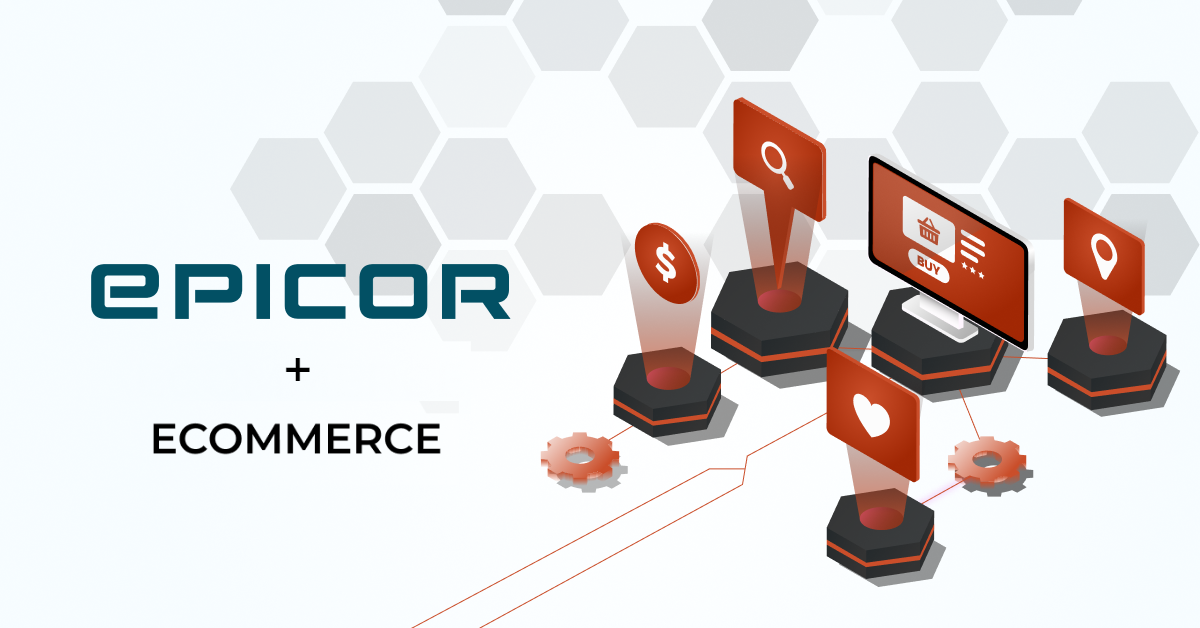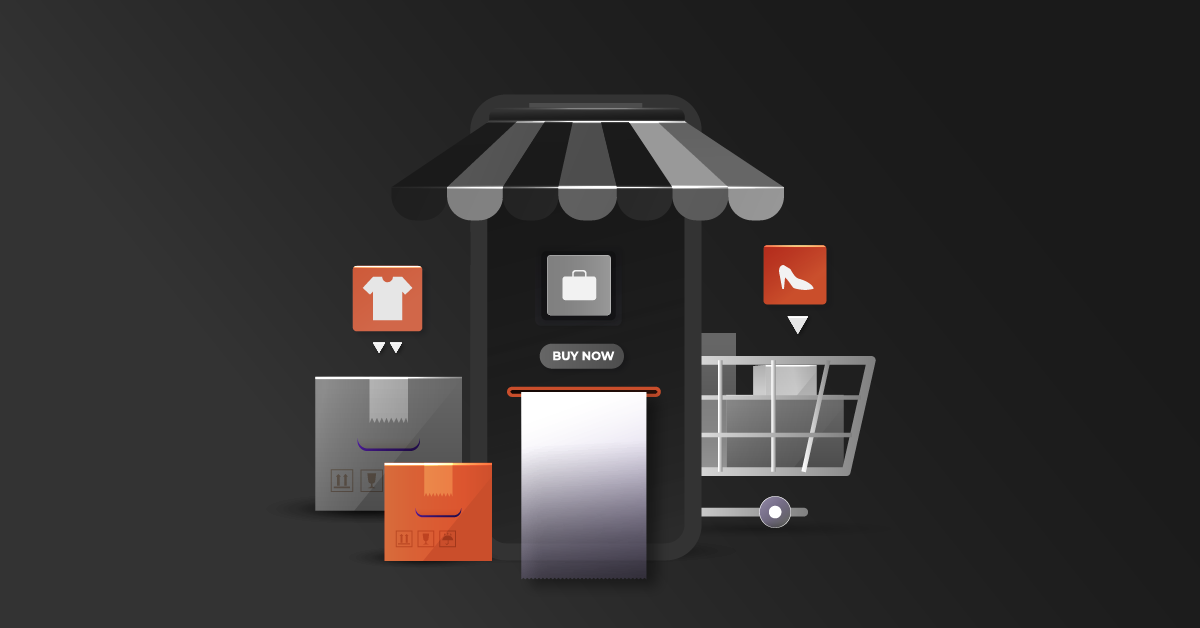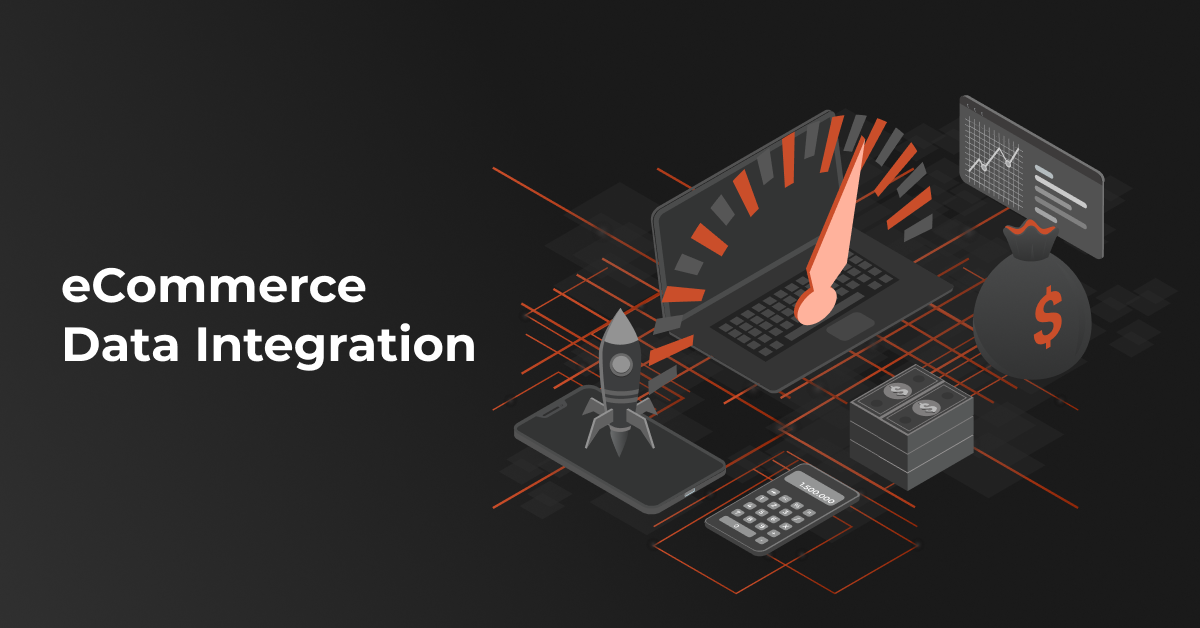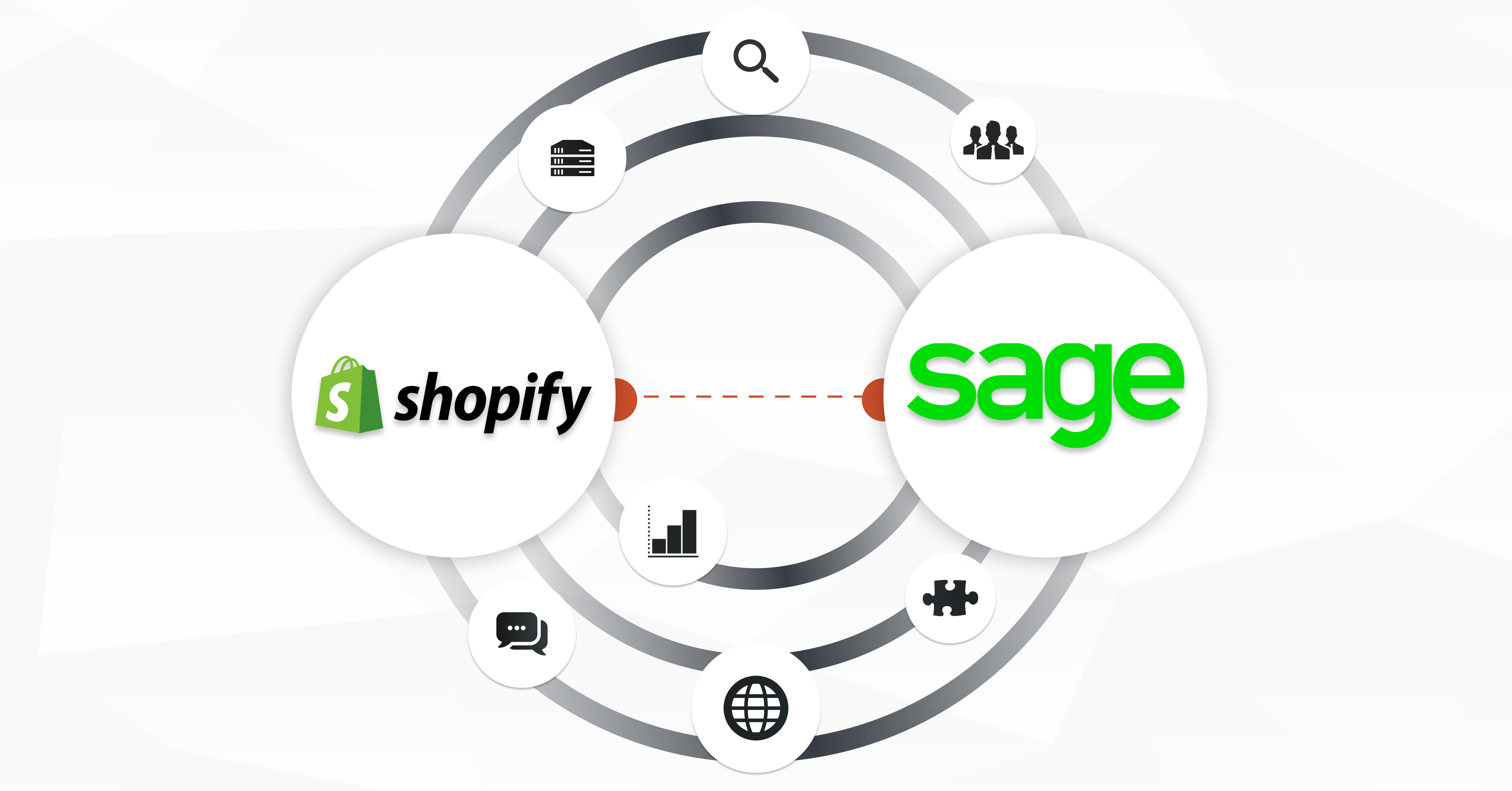Epicor is a renowned ERP software vendor for manufacturing, distribution, finance, and HR. ecommerce offers businesses a seamless shopping experience, from browsing to buying and shipping.
Effective integration can syncs product, inventory, price, and order data between ERP and ecommerce platforms. This connection reduces manual data entry errors and increases accuracy and efficiency. It also provides real-time visibility into inventory, order status, and customer data by integrating data sources and helping businesses make better decisions and improve customer service.
Contents
Steps for Integrating eCommerce and Epicor
Keep in mind these steps to ensure the integration you choose is the right match for your business requirements:
1. Choose an ecommerce platform:
If you haven’t yet, select an ecommerce platform or best Ecommerce Connector that matches your business requirements. Shopify, Adobe Commerce (Magento), BigCommerce, and WooCommerce are choices.
2. Assess needs:
Your items, order fulfillment method, and payment gateway should be determined. This will guide your ecommerce platform and integration choices.
3. Select an integration solution:
After identifying your ecommerce platform and requirements, choose an integration solution that works with Epicor software and your ecommerce platform. DCKAP Integrator – ecommerce integration platform , Epicor Commerce Connect, WooCommerce ERP integration, Clarity eCommerce, and eBridge Connections integrate.
4. Install and setup the integration solution:
Follow its instructions. Installing the integration solution software, connecting it to your ERP system, and mapping ecommerce platform data fields to Epicor is routine.
5. Test the integration:
Test the integration after configuring it. This includes testing Epicor and your ecommerce platform’s product, inventory, price, and order synchronization.
6. Go live:
After testing the integration, go live. Ensure your employees know how to utilize the integrated system, and keep testing and monitoring it.
These methods will integrate your Epicor ERP platform with your ecommerce platform, streamlining your online sales process and improving your business operations.
Top Ways to Integrate eCommerce and Epicor
1. Middleware Integration:
Epicor is often integrated with ecommerce systems via middleware. Middleware connects disparate systems and lets them communicate. Middleware solutions communicate product, pricing, inventory, order, and customer data between Epicor and ecommerce systems using pre-built connectors.
Middleware is simple and requires little coding. They allow businesses or companies to tailor data synchronization in real-time. Middleware can scale ecommerce operations and interface with new platforms.
2. Custom Integration:
Businesses can create a customized integration solution. This integration method lets organizations create a custom solution that works with their existing systems. Custom integration needs technical skills, resources, time, and testing.
Custom integration lets organizations tailor the solution to their needs. Custom integration is costly and time-consuming to design and maintain; therefore, not all organizations can afford it.
3. API Integration:
APIs can help connect ecommerce platforms to Epicor. APIs enable system-to-system communication in software applications. Epicor and ecommerce platforms can share products, pricing, inventory, orders, and customer data via API connectivity.
API (Application Programming Interface) integration updates both systems in real-time. It also allows firms to scale their ecommerce operations and interface with new platforms. API integration may need to be more technical for some organizations to establish and manage.
4. Third-Party Seamless Integration:
Third-party providers offer pre-built integration solutions. Third-party integration solutions usually have pre-built connectors to sync data between ecommerce platforms and Epicor versions.
Installing and using third-party integration solutions requires little technical knowledge.
They enable ecommerce organizations to scale and interface with new platforms. Third-party integration solutions may not be as customizable or suit all of a business’s integration needs.
What are the benefits of eCommerce integration with Epicor?
Streamlined operations
Syncing data between Epicor and an ecommerce platform reduces manual data input errors and improves accuracy, streamlining corporate operations.
Increased efficiency
Automating data flow between Epicor and your ecommerce platform saves time on manual chores and managing services like processing orders, maintaining inventory levels, and managing customer data.
Improved customer experience
Epicor ecommerce Integration provides real-time inventory, order progress, and customer data. This can improve customer service, delivery schedules, and product availability information for businesses.
Better decision-making
Integrating Epicor api with an ecommerce platform gives firms real-time data and insights. Businesses may make smart product pricing, inventory, and marketing decisions with access to the correct information. Integrating ecommerce and ERP data creates a single source of truth for enhanced decision-making.
Increased revenue
Sales reps may view real-time inventory, pricing, and order history thanks to the connectivity. This accessibility enables sales reps to deliver correct, up-to-date information to customers, improving sales success and customer satisfaction.
Epicor ecommerce Integration can boost income by boosting client retention, contentment, and the shopping experience. Integration opens additional sales channels, helping businesses sell more products to a larger customer base.
Team Collaboration and Efficient Operations
Epicor eCommerce Integration centralizes ecommerce processes to improve teamwork. It facilitates teamwork, real-time data access, and quick client service.
Integration ensures that everyone is on the same page and working toward the same goals, making operations more efficient.
Answering Buyer Questions
eCommerce consumers frequently ask about products, delivery, and returns. Businesses can quickly and accurately answer buyer inquiries with Epicor’s ecommerce integration.
Customer care personnel can efficiently assist buyers by accessing real-time data and order details. Resolving buyer issues quickly can boost customer satisfaction and loyalty.
Online Customers Get a Better Web Store Experience
Epicor eCommerce Integration helps organizations create a seamless and personalized web store experience for customers. Epicor helps businesses establish user-friendly and visually beautiful web stores by leveraging the Magento ecommerce platform, a popular choice among enterprises.
These web stores can be tailored to fit the company image and offer many features, such as personalized product recommendations, user feedback, and easy navigation, to make online shopping fun and easy.
Fast Quote Orders and Convenient Shopping
Businesses must offer convenient and efficient shopping to compete. Epicor ecommerce Integration lets businesses quickly quote orders so customers can compare prices and make informed purchases.
With stored shopping carts and wish lists, shoppers can easily return to their desired products and complete their purchases at a convenient time. These characteristics boost revenue and client loyalty.
Robust Data Management and Complete Account History
Epicor eCommerce Integration has sophisticated data management and a powerful transaction engine. Businesses can safely take payments, store product information, and handle complex pricing structures with it.
The integration gives businesses a complete view of their consumers, their purchasing history, and their preferences, enabling targeted marketing and customer engagement.
ROI with Great Service
Epicor eCommerce Integration gives firms a measurable ROI. Businesses can save money and gain income by improving operations, customer service, and sales.
Some of the other benefits are:
- Demo and Competitors Analysis
- End-to-End and Centralized Management
- Tight Integrations and Attractive Price Point
- Developer Resources and Support
- One-Stop Shop and Full Lifecycle Solutions
- Affiliates and Further Communications
- Contact Information and Privacy Policy
How do you choose the right ecommerce Epicor Integration?
Business needs, budget, and technological skills determine the best Epicor ecommerce integration. Key considerations:
Integration features
Product information synchronization, product management, inventory management, pricing updates, and order fulfillment are integration aspects to consider. Choose a solution that fits your business’s features. Epicor, a feature-rich ecommerce technology platform, integrates the ERP system and ecommerce website.
Compatibility with Epicor and ecommerce platform
Make sure your integration solution works with the Epicor ERP platforms and your ecommerce platform. Check the integration solution’s compatibility with your software versions.
Ease of use
Choose an integration solution that requires little technical knowledge. Make sure the solution has clear installation and configuration manuals and support.
Technical support and maintenance
Consider the integration solution provider’s support and maintenance offerings. To maintain the integration, ensure they provide trustworthy support, regular updates, and a maintenance strategy.
Cost
Businesses considering ERP ecommerce integration must include the cost of commerce. Consider the integration solution’s cost, including maintenance and subscription fees. Pick a solution that’s affordable and offers good value for money.
Reputation and reviews
Check the integration solution provider’s reputation and client reviews to make sure they deliver reliable and effective solutions.
What are possible use cases for ecommerce Epicor integration?
Retail businesses:
Epicor recognizes the value of a strong web channel presence for businesses to access a larger customer base and increase revenue streams.
Epicor ecommerce Integration manages services like synchronizing product information, price, and inventory levels across Epicor ERP systems and ecommerce platforms. The integration lets retailers manage online stores and submit distributor orders.
This reduces errors and improves the user experience by providing accurate product information, prices, and availability. Integration also streamlines order processing and fulfillment by automating data entry.
Wholesale and distribution businesses:
Wholesale and distribution companies may handle B2B ecommerce with Epicor ecommerce Integration. Integration can manage services like automating ordering, offering real-time inventory information, and improving order fulfillment.
Integrating pricing and order status updates reduces errors and improves customer satisfaction. Wholesale and distribution organizations can handle customer accounts, self-service applications, and placing orders through integration.
Manufacturing businesses:
Epicor’s implementation ecosystem and developer resources allow businesses to customize and improve their ecommerce websites with a variety of tools and extensions. Businesses can stay competitive, embrace constant innovation, and adapt to changing customer expectations.
Manufacturing companies can improve inventory management and business processes through integration. Epicor ecommerce Integration lets manufacturers sell products and services online and update clients on inventory and order progress.
Integration automates sales, reduces errors, and boosts customer happiness. Integration can also automate order processing and fulfillment.
Service-based enterprises:
Epicor ecommerce Integration lets service-based businesses sell online and offers real-time quotations and bookings. Integration automates booking, reduces errors, and boosts client satisfaction.
Centralizing data gives businesses a 360-degree perspective of client interactions across touchpoints. Integration also streamlines scheduling and service fulfillment.
Epicor ecommerce Integration improves operations, customer experience, customer expectations, and profitability for all organizations. Businesses can increase success and growth by integrating Epicor ERP system data with their ecommerce platform.
Streamline Your e-Commerce Epicor Integration — Using DCKAP Integrator
DCKAP Integrator integrates ecommerce systems with Epicor smoothly. DCKAP Integrator can simplify Epicor integrations, Epicor ecommerce integration , Epicor Shopify integration or Shopify Epicor P21 integration :
Real-time Data Synchronization:
DCKAP Integrator syncs Epicor and ecommerce platforms in real-time. Product information, pricing, inventory levels, orders, and customer data can be sent effortlessly between the two platforms. This keeps both systems up to date, allowing businesses to make educated decisions and provide a smooth buying experience.
Automated Order Fulfillment:
The DCKAP Integrator automates order fulfillment, allowing firms to process orders quickly and accurately. It instantly connects ecommerce order data to Epicor, minimizing manual data entry errors and boosting order accuracy. Orders are fulfilled on time, and backorders are reduced.
Inventory Management:
DCKAP Integrator allows organizations to control inventory levels across different sales channels in real-time. It automatically adjusts inventory levels on Epicor and ecommerce platforms so firms can fulfill orders quickly. This helps firms maintain proper inventory levels and minimize stockouts.
Customization:
DCKAP Integrator can be tailored to match a business’s needs. Businesses can map data between Epicor and ecommerce platforms using its versatile mapping options. Businesses can automate particular procedures in a way and streamline ecommerce operations with custom workflows. This allows organizations to customize the integration to match their needs and boost productivity.
Scalability:
The DCKAP Integrator allows businesses to seamlessly integrate with new platforms and extend their ecommerce operations. Businesses can run smoothly without downtime since they can manage large amounts of data and execute reliably. This allows firms to expand their ecommerce operations without worrying about integration performance.
DCKAP Integrator is a powerful middleware integration solution for Epicor ecommerce integration. It provides real-time data synchronization, automated order fulfillment, inventory management, customization, scalability, and ease of use, helping businesses run efficiently and giving customers a smooth shopping experience.
Conclusion
eCommerce integration with Epicor ERPs gives firms extensive experience and a robust solution for optimizing operations and improving consumer experiences. Businesses may centralize ecommerce processes, boost revenue, and boost customer happiness by using both platforms.
Businesses can maximize Epicor ERP and Magento’s capabilities by customizing their integration with extensive developer resources. The integration’s accessibility and data security improve Epicor’s ecommerce ecosystem partnership. Epicor follows the Epicor Privacy Policy when organizations integrate client data.
FAQs
Epicor supports which ecommerce platforms?
Epicor ecommerce Integration supports Shopify, Magento, WooCommerce, BigCommerce, and others. Integration solutions differ by ecommerce platform or website.
What Epicor ERPs can be integrated?
All ERP products by Epicor can be leveraged via integration. Whether you are using Prophet 21, Eclipse, Kinetic or even non-Epicor ERPs, integration is a viable means of improving your business operations.
What Epicor-ecommerce data can be synchronized?
Epicor ecommerce Integration syncs product, pricing, inventory, orders, and customer data between the ERP system and the ecommerce platform. Businesses can reduce errors and improve customer satisfaction by syncing data.
Is Epicor ecommerce integration a highly technical process?
Epicor ecommerce Integration installation and configuration require technical skills. Many integration solutions provide documentation and support for installation and configuration. Third-party integrators can help install and configure.
Can Epicor ecommerce Integration automate online sales?
Epicor ecommerce Integration can streamline online sales by synchronizing data between Epicor ERP and the ecommerce platform, eliminating errors and streamlining operations. Integration can streamline order processing and fulfillment by automating data entry.
How will Epicor ecommerce Integration help my business?
Epicor ecommerce Integration improves accuracy, reduces errors, streamlines operations improves the customer experience, and boosts profitability. Businesses may automate procedures, decrease errors, and improve customer buying experiences by synchronizing Epicor and ecommerce data.
Which Epicor ecommerce integration solution is best for my business?
Consider integration features, compatibility with Epicor and ecommerce platforms, ease of use, technical support and maintenance, cost, reputation, and reviews when choosing an Epicor ecommerce integration solution for your organization. Choose a solution that suits your business objectives and integration goals.




